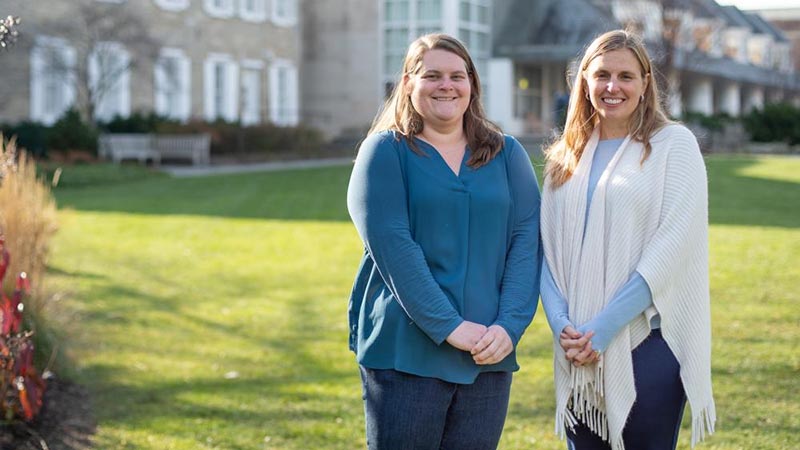
“An individual’s beliefs can be a powerful factor that impacts their teaching or learning behaviors,” said Sarah Zappe, right, director of assessment and instructional support and research professor at the Leonhard Center. Stephanie Cutler, left, is an assessment and instructional support specialist and associate research professor at the Leonhard Center. IMAGE: KELBY HOCHREITHER
Leonhard Center faculty receive dual grants to advance engineering education
A course redesign, mixed-methods research study on faculty beliefs on tap
12/3/2021
By Mariah Chuprinski
UNIVERSITY PARK, Pa. — Faculty members in Penn State’s Leonhard Center for the Enhancement of Engineering Education have received two grants from the Kern Entrepreneurial Engineering Network to enhance the educational experience for both students and instructors.
Sarah Zappe, director of assessment and instructional support and research professor at the center, will lead an approximately $100,000 research study on how instructors’ beliefs can impact how they learn and teach students.
“There has been a lot of research recently that an individual’s beliefs can be a powerful factor that impacts their teaching or learning behaviors,” Zappe said, explaining that it matters less whether an ability is actually innate or can be learned, but rather, what a person believes about their own approach to the ability. “It is a person’s beliefs on their abilities that actually drive certain behaviors.”
Co-principal investigator Stephanie Cutler, assessment and instructional support specialist and associate research professor at the Leonhard Center, related the concept of innate or learned abilities to athletics.
“I have a fixed mindset about something like running a marathon, for example,” Cutler said. “That is not something I think I’ll ever be able to do. But when thinking about most sports, you start off by learning the basics and eventually develop the skills through practice. That’s demonstrating a growth mindset: believing you can improve on your abilities.”
Students and teachers can form fixed mindsets in subtle ways, Cutler said, by saying someone is a “natural” teacher, for example, or a “natural” problem-solver.
Zappe and Cutler will administer a survey to all College of Engineering faculty, with questions on their beliefs and practices related to a variety of topics such as intelligence, creativity and math and language abilities.
After analyzing the survey results, the research team will conduct one-on-one interviews with select survey participants to gain additional information on their responses and ways of thinking.
“We will use the qualitative interviews to dig deeper into fixed-versus-growth oriented mindsets,” Cutler said. “We will expand on our survey questions and, in particular, explore their perspectives on different engineering skills and abilities.”
The interviewees will be strategically selected to obtain a diverse group of people from different genders, academic positions and countries of origin.
“We hypothesize that instructors’ beliefs about the nature of intelligence, certain professional skills and engineering abilities can impact their teaching strategies,” Zappe said. “By understanding the relationship between instructors’ beliefs and their teaching practices, we can potentially identify another mechanism for enhancing teaching and learning. If we find that there is a strong relationship between engineering instructors’ beliefs about the nature of ability, we can then have workshops and interventions to potentially change their beliefs and promote evidence-based instructional practices.”
Tom Litzinger, assistant dean for educational innovation and accreditation, professor of mechanical engineering and executive director of the Leonhard Center, will serve as co-principal investigator on the grant.
Enhancing the experience of teaching assistants
Cutler, with Zappe as co-PI, will lead a project to redesign an existing graduate course in the College of Engineering. The $95,000 award is an extension of a previous grant, awarded in 2019, that drew on the parallels between entrepreneurship and teaching to help faculty become more innovative in the classroom.
This time, Cutler will create a suite of course modules surrounding the theme of entrepreneurship to enhance ENGR 888: Teaching Seminar for Graduate Engineering Instructors. The Leonhard Center will co-create the course with Karen High, professor of engineering and science education at Clemson University. High, who received her master’s and doctoral degrees from Penn State, has collaborated with members of the Leonhard Center on past projects.
“The course will be designed to encourage different attributes that are integral to entrepreneurship, like creativity, problem-solving, empathy or curiosity,” Cutler said. “And we will support students in making connections between those attributes, good teaching practices and research mentoring.”
The course, which usually welcomes about 100 students annually, helps support graduate students who want to build up their teaching skills to later apply for academic positions, Cutler said. It is a required one-credit course for engineering teaching assistants who lead their own section, recitation or lab.
“The redesigned course will help teaching assistants to view the course not only as it relates to improving their teaching, but also as a much more holistic professional development opportunity that can help impact their overall future career,” Cutler said.
The projects are funded by KEEN, a partnership of 50 colleges and universities whose mission is to instill an entrepreneurial mindset in engineering undergraduates. KEEN will administer the grant through a subcontract with Arizona State University’s Mentorship 360 project.



